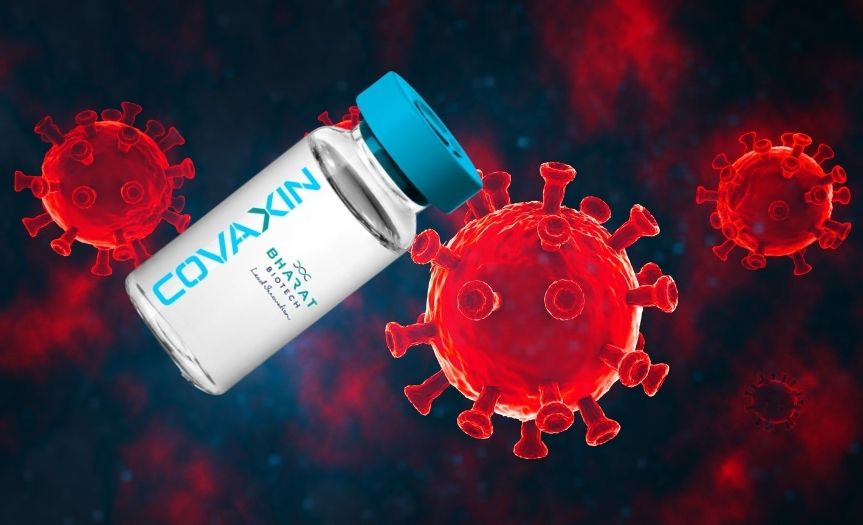Bharat Biotech announced today its COVID-19 Vaccine COVAXIN has demonstrated 93.4% effectiveness against severe covid-19., a global leader in vaccine. Bharat Biotech revealed the safety and efficacy analysis data from Phase III clinical trials of COVAXIN®, a whole virion inactivated vaccine against SARS-CoV2, was developed in partnership with ICMR and NIV Pune on Saturday. The pre-print was published in medical journal medrxiv.
Highlights of final COVAXIN Phase 3 results
Vaccination was well tolerated with an overall incidence of adverse events observed over a median of 146 days that was lower than that observed with other COVID-19 vaccines
● Efficacy analysis demonstrates COVAXIN® to be 77.8% effective against symptomatic COVID-19, through evaluation of 130 confirmed cases, with 24 observed in the vaccine group versus 106 in the placebo group
● Efficacy analysis demonstrates COVAXIN® to be 93.4% effective against severe symptomatic COVID-19
● Safety analysis demonstrates adverse events reported were similar to placebo, with 12% of subjects experiencing commonly known side effects and less than 0.5% of subjects feeling serious adverse events
● Efficacy data demonstrates 63.6% protection against asymptomatic COVID-19
● Efficacy data demonstrates 65.2% protection against the SARS-CoV-2, B.1.617.2 Delta variant
Read the full Pre-Print Publication of the Phase 3 here: https://www.medrxiv.org/content/10.1101/2021.06.30.21259439v1
Pls find the Video Quote from Dr Krishna Ella , CMD Bharat Biotech and Mrs. Suchitra Ella, JMD Bharat Biotech https://drive.google.com/drive/folders/1UGb5H-ck9Gggui7qmBlZXqDSl_OtlqHn?usp=sharing
Phase 3 clinical trials of COVAXIN® was an event driven analysis of 130 symptomatic COVID-19 cases, reported at least two weeks after the 2nd dose, conducted at 25 sites across India. COVAXIN® is formulated with a novel Algel+IMDG adjuvant. IMDG is a TLR7/8 agonist known to induce memory T cell responses along with strong neutralizing antibodies.
The activation of cell mediated immune responses is especially valuable in a multi epitope vaccine such as COVAXIN®, where immune protection can be achieved from S, RBD and N proteins alike. IMDG was developed under partnership between Virovax and NIAID, National Institutes of Health USA.
COVAXIN® was well tolerated and the Data Safety Monitoring Board has not reported any safety concerns related to the vaccine. The overall rate of adverse events observed in COVAXIN® was lower than that seen in otherCovid-19 vaccines. The safety profile of COVAXIN® is now well established based on inactivated vaccines technology, and in large part due to the extensive 20-year safety track record of Bharat Biotech’s vero cell manufacturing platform. Furthermore, Bharat Biotech has so far not sought indemnity for COVAXIN® from the Governments.

In his Dr. Raches Ella, of Bharat Biotech wrote 365 days: from initiating a phase 1 trial to releasing preliminary phase 3 efficacy results of #COVAXIN ‘s Phase 3 efficacy results. Efficacy=78% | Severe=93%| Asymptomatic=63%| Safety outcomes well tolerated. Benefits outweigh the risk.
No licensed SARS-CoV-2 vaccine has reported efficacy against asymptomatic infection in a randomised controlled trial, based on qPCR testing. COVAXIN® is the first to report promising efficacy against asymptomatic infections based on qPCR testing that will help in reducing disease transmission.
Dr. Krishna Ella, Chairman & Managing Director, Bharat Biotech, said, “The successful safety and efficacy readouts of COVAXIN® as a result of conducting the largest ever COVID Vaccines trials in India establishes the ability of India and developing world countries to focus towards innovation and novel product development. We are proud to state that Innovation from India will now be available to protect global populations.”
COVAXIN® has been specifically designed to meet the needs of global distribution chains, the requirements for which are more critical in low- and middle-income countries. It has been formulated to enable shipping and long-term storage at 2-8ºC. It is also formulated to adhere to a multi-dose vial policy, thereby reducing open vial wastage, saving money to procurement agencies and governments alike.
Prof. (Dr) Balram Bhargava, Secretary Department of Health Research & Director General Indian Council of Medical Research, said, “I am delighted to note that COVAXIN®, developed by ICMR and BBIL under an effective public private partnership, has demonstrated an overall efficacy of 77.8% in India’s largest COVID phase 3 clinical trial thus far. Our scientists at ICMR and BBIL have worked tirelessly to deliver a truly effective vaccine of highest international standards. COVAXIN® will not only benefit the Indian citizens but would also immensely contribute to protect the global community against the deadly SARS-CoV-2 virus. I am also pleased to see that COVAXIN® works well against all variant strains of SARS-CoV-2. The successful development of COVAXIN® has consolidated the position of Indian academia and Industry in the global arena.”
Bharat Biotech is a company driven by science and validated by empirical evidence. Its commitment to data transparency has been proven again with 10 publications on COVAXIN®, covering all aspects of product development, all within 12 months.
Bharat Biotech’s commitment to continued improvement of COVAXIN® is well under way with additional clinical trials to establish safety and efficacy in children between 2-18 years of age. A clinical trial to determine the safety and immunogenicity of a booster dose is also in process. Several research activities are being carried out to study variants of concern and to assess their suitability for follow up booster doses.
Mrs. Suchitra Ella, Joint Managing Director, Bharat Biotech, said, “It is a momentous day for everyone, at Bharat Biotech, as we announce the Final Phase-3 Results of COVAXIN® and its efficacy of 77.8%. We wish to thank ICMR, NIV-Pune, Virovax, DSMB and Adjudication Committee. We earnestly thank our clinical trial sites, Principle Investigators, IQVIA, and every participant who has reposed their faith in COVAXIN®. We SINCERELY thank all our employees for enduring work pressures through the pandemic & lockdowns, with 24×7 commitment amidst unprecedented number of physical challenges, stress and continuous operations. We specially thank our medical affairs team for leading the project, the technical and marketing teams who have relentlessly worked to complete the clinical trials and coordination of 25 sites across the country since May 2020.”
COVAXIN® has been evaluated through neutralizing antibody responses against several variants of concern, namely B.1.617.2 (Delta), B.1.617.1 (Kappa), B.1.1.7 (Alpha), B.1.351 (Beta), P2- B.1.1.28 (Gamma). The data from these studies have been extensively published in peer reviewed journals and available for review in the public domain.
Prof. (Dr) Priya Abraham, Director National Institute of Virology ICMR said, “The overall efficacy of 77.8 % following the phase III clinical trial of COVAXIN® is wonderful news. ICMR-NIV and BBIL have had very fruitful interactions during this exhilarating journey. Sera from COVAXIN® recipients have also been evaluated against viral variants detected in India i.e., the Alpha, Beta, Zeta, Kappa and Delta. The making of this vaccine entirely on Indian soil is a matter of great pride to every Indian”
COVAXIN® has now received emergency use authorizations in 16 countries including, Brazil, India, Philippines, Iran, Mexico, etc. with EUA’s in process in 50 countries worldwide. The company is in discussions with WHO to obtain emergency Use Listing for COVAXIN®. The product has been exported to several countries with additional requests for supplies being received.
Bharat Biotech has established COVAXIN® manufacturing at 4 facilities within India, further expansions are in process to reach an annualized capacity of 1 billion doses by the end of 2021. Technology transfer activities are in progress to companies in United States, and other countries.
More about COVAXIN® – https://www.bharatbiotech.com/covaxin.html
Read the full Pre-Print Publication here: https://www.medrxiv.org/content/10.1101/2021.06.30.21259439v1






